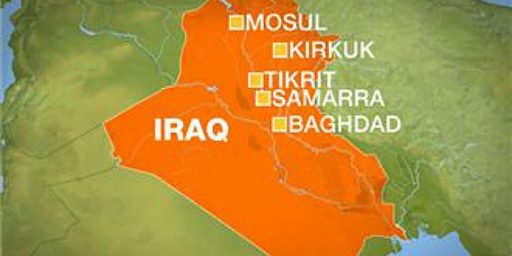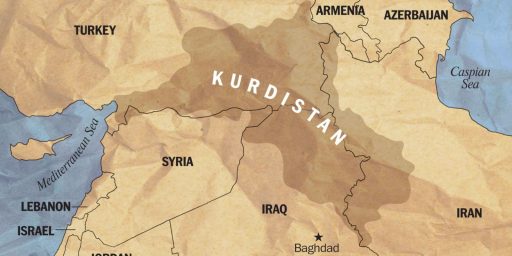Iraq Civil War Could Spread, If it Happens
The Associated Press is beginning a series of long articles exploring the repurcussions of an Iraqi civil war that has yet to take place and seems less likely today than yesterday.
Iraq Civil War Could Have Dominoe Affect
Any all-out civil war in Iraq could shake the political foundations of places beyond that stricken land, sending streams of refugees across Iraqi borders, tempting neighbors to intervene, and renewing the half-buried old conflict of Sunni and Shiite in the Muslim world, Middle East analysts say. “If it’s a war between Sunni and Shiite, this war might be extended from Lebanon to Afghanistan,” says Diaa Rashwan, an Egyptian expert on Islamic militancy.
In a series of Associated Press interviews, other regional specialists didn’t foresee such falling dominoes — open war between Islam’s two branches spreading elsewhere from Iraq. But they believe regional tensions have already sharpened because of the rise of Iraqi Shiites to power under U.S. military occupation. This “really changes the power structure in the Middle East, not only in Iraq, but in Lebanon and Saudi Arabia,” said longtime U.S. Mideast scholar William R. Polk, referring to two other Arab lands with fragile religious divides.
Iraq’s new constitution, approved in an Oct. 15 referendum whose results were certified Tuesday, is largely opposed by the Sunni Muslim minority, since it could lead to a virtual breakup of the country into oil-rich Shiite and Kurdish regions in the south and north, and a resource-poor Sunni center.
Well, no. Rather clearly, the constitution provides centralization of control of energy resources:
Article 108: “Oil and gas are the ownership of all the people of Iraq in all the regions and governorates.”
Article 109: “The federal government with the producing governorates and regional governments shall undertake the management of oil and gas extracted from current fields provided that it distributes oil and gas revenues in a fair manner in proportion to the population distribution in all parts of the country with a set allotment for a set time for the damaged regions that were unjustly deprived by the former regime and the regions that were damaged later on, and in a way that assures balanced development in different areas of the country, and this will be regulated by law.”
Source: Excerpts From the Iraqi Constitution (WaPo, Oct. 11)
It’s not inconceivable that non-Kurdish Sunnis, bitter at being relegated to a say in public policy commensurate with their proportion of the population, could escalate the insurgency to the level of “all-out civil war.” One would think, though, they would have done so ahead of the ratification of the constitution. Indeed, they didn’t even vote down the constitution when they had the power to do so by managable supermajorities (2/3) in three provinces.
A key neighbor has voiced urgent concern. “All the dynamics are pulling the country apart,” Saudi Arabia’s foreign minister, Prince Saud al-Faisal, said of Iraq. Speaking with Washington reporters on Sept. 22, the Saudi also warned that Iraq’s disintegration would “bring other countries in the region into the conflict.”
Turkey and Iran top that list. The Turks might be tempted to intervene in Iraq’s north to keep its autonomous Kurds from supporting Turkey’s own Kurdish separatists. Shiite Iran might act — with arms, intelligence, even “volunteers” — to ensure victory by a friendly Iraqi Shiite leadership in any civil war, analysts say. “The Turks would be the most worried and have the most capacity” — a strong military — “to do something about it,” said Polk.
Persian Iran, sharing a long border and a history of warfare with Arab Iraq, has multiple interests in its neighbor’s future, noted W. Andrew Terrill, Mideast specialist at the U.S. Army War College. The Iranians clearly don’t want a return to a hostile Sunni-led Iraq like that of ousted President Saddam Hussein. But Terrill said Tehran also must worry about a Shiite-run government that is too reliant on Washington “that is willing to accept permanent U.S. military bases that may be used to threaten and intimidate the Iranian regime.”
Two mostly Sunni neighbors, Syria and Jordan, are largely unable and unlikely to try to influence a civil war next door, analysts say. But both would bear a heavy burden if Iraqi Sunnis were driven to seek refuge across the border, fleeing Balkan-style “ethnic cleansing” — a prospect haunting regional officials.
If these countries were sufficiently concerned about these eventualities to risk going to risk war with the United States–the obvious consequence of such intervention–wouldn’t they have done so earlier? Turkey, while certainly concerned about the Kurdish issue, nearly supported the Coalition war effort. Remember, the executive actually authorized the staging of a prong of the attack from their territory before derailed by the legislature– and even parliamentary support would have been forthcoming had the U.S. ponied up more extortion money.
It is also unclear why Iran would be willing to go to war with the United States in order to prevent the United States from being slightly better positioned to go to war against Iran. Given the U.S. global reach, including other bases and a naval carrier fleet in the region, the basing of far fewer military troops in Iraq than are there now would hardly seem the tipping point.






More MSM cheerleading for failure in Iraq. Someday maybe their dreams will come true.
Wow, so much to debunk, and so little time:
“The Associated Press is beginning a series of long articles exploring the repurcussions of an Iraqi civil war that has yet to take place and seems less likely today than yesterday.”
Why? The election? Didn’t help much the last time, and the Sunni Arabs just got taught that their political power comes pretty much soley from the IED.
“Well, no. Rather clearly, the constitution provides centralization of control of energy resources:”
Of course. I’ll bet it also provides human rights, honesty in government, and yadda yadda yadda. If the Shiites and the Kurds control the central government, and most of the regional governments where the existing oilfields are, the Sunni Arabs are out of luck, aren’t they?
“If these countries were sufficiently concerned about these eventualities to risk going to risk war with the United States–the obvious consequence of such intervention–wouldn’t they have done so earlier? Turkey, while certainly concerned about the Kurdish issue, nearly supported the Coalition war effort. Remember, the executive actually authorized the staging of a prong of the attack from their territory before derailed by the legislature– and even parliamentary support would have been forthcoming had the U.S. ponied up more extortion money.”
And a lot of Turkish fears of the consequences of a war on their border have come true; I doubt that the Bush administration has the cred with Turkey that it did before the war.
As to why they’d intervene, there’s always the obvious freakin’ reason that continuing and expanding chaos on a country’s border can cause intervention, even if there are powerful counterforces.
“It is also unclear why Iran would be willing to go to war with the United States in order to prevent the United States from being slightly better positioned to go to war against Iran.”
1) Hit the US at a point of vulnerability, rather than waiting for the US to attack. If you’re working under the assumption that it’s not a matter of ‘if’, but of ‘when’, that makes sense.
2) Iranian intervention doesn’t need to be overt; their most likely goal is to have a friendly Shiite government controlling the regions of Iraq which border Iran (with the possiblity of taking more, if it becomes available).
“Given the U.S. global reach, including other bases and a naval carrier fleet in the region, the basing of far fewer military troops in Iraq than are there now would hardly seem the tipping point. ”
No, but the tying down of a lot of troops helps, particularly if there’s a Shiite uprising against US forces.
Since various sects have been at war with each other for centuries in that region, is it not a little naive to think a constitution will patch up ancient hatreds quickly? Iran’s nukes are the joker in the deck, and Israel is unlikely to let that get completely out of hand when current Iranian leaders are publicly calling for Israel to be “wiped off the map.”
Bachbone, unfortunately, things are a bit more complicated. If Israel attacks Iran, Iran has good reason to screw with the US, and many Iraqis will agree.